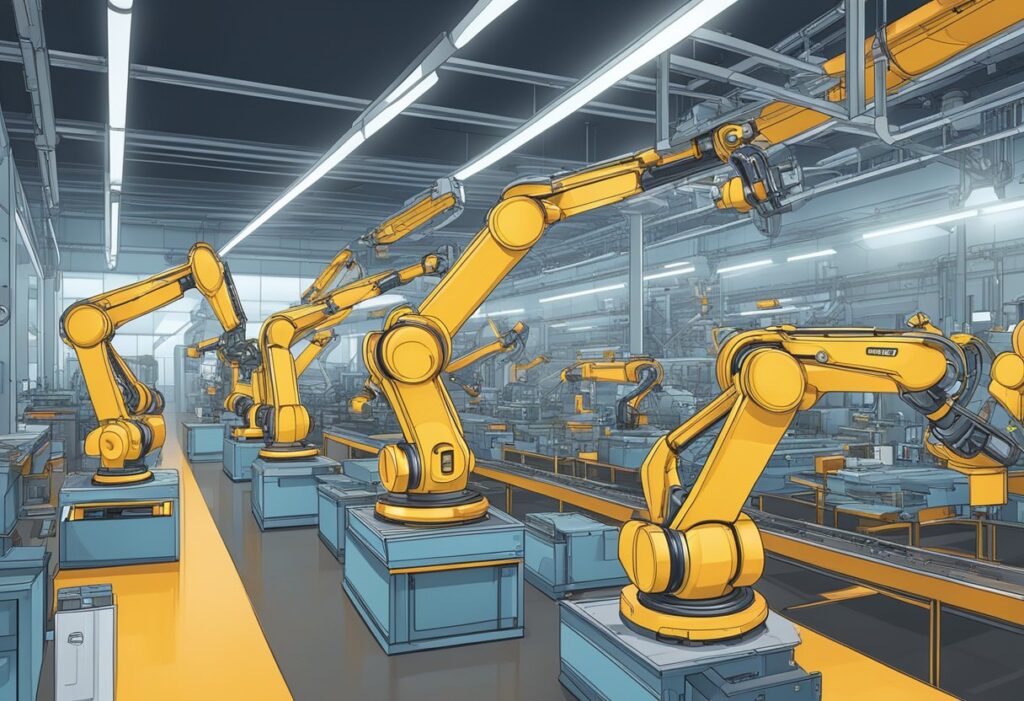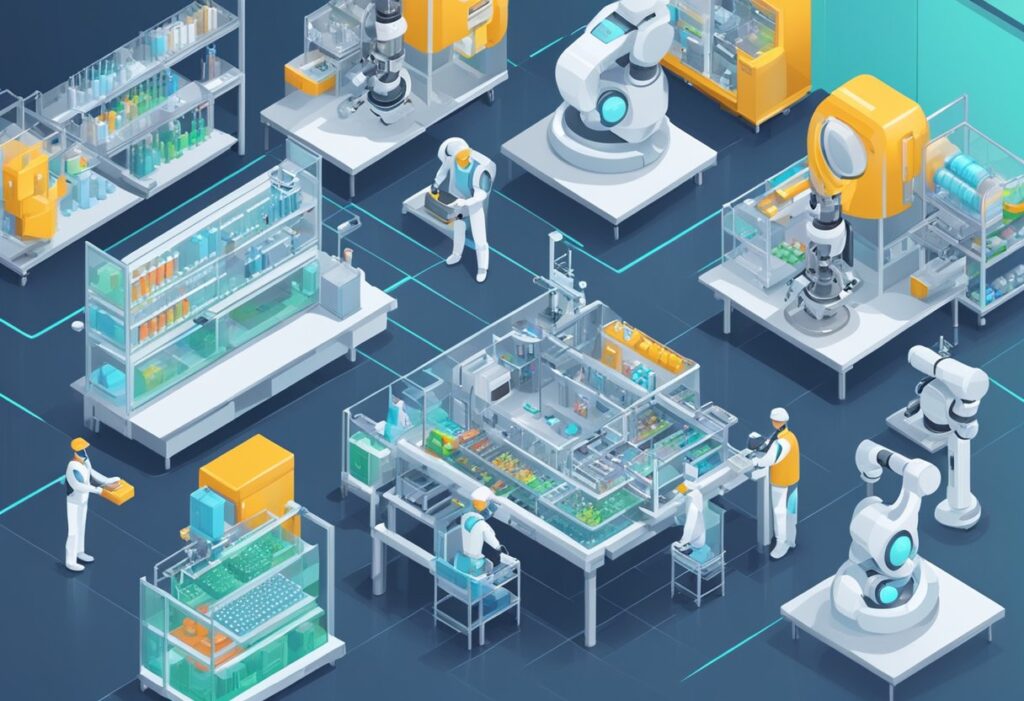Artificial intelligence (AI) is revolutionizing the manufacturing industry and transforming the way businesses operate. AI is helping manufacturers to optimize production, improve efficiency, and enhance decision-making processes. AI is reshaping five manufacturing industries, including automotive, electronics, food and beverage, pharmaceuticals, and textiles.
In the automotive industry, AI is being used to improve the production process, reduce costs, and enhance the quality of vehicles. AI-powered robots are being used to assemble car parts, and AI algorithms are being used to optimize the supply chain and improve logistics. AI is also being used to develop autonomous vehicles, which are expected to revolutionize the transportation industry.
In the electronics industry, AI is being used to improve the design and manufacture of electronic components. AI algorithms are being used to optimize the production process, reduce defects, and improve the quality of electronic products. AI is also being used to develop new electronic components, such as flexible displays and wearable devices, which are expected to transform the electronics industry.
Automotive Industry

The automotive industry has been one of the early adopters of AI in manufacturing. AI-powered robotics and automation systems have enabled car manufacturers to streamline their production lines, reduce errors, and increase efficiency.
Robotics and Automation
Robots are being used in the automotive industry for various tasks such as welding, painting, and assembly. According to Forbes, AI-powered robots can learn from their experiences and improve their performance over time. This means that they can adapt to new situations and perform tasks more accurately and efficiently.
Moreover, AI-powered robotics and automation systems can work alongside human workers, reducing the risk of accidents and injuries. This, in turn, leads to a safer working environment and higher employee satisfaction.
Quality Control and Optimization
AI is also being used in the automotive industry for quality control and optimization. AI-powered systems can analyze data from sensors and cameras to detect defects and errors in real-time. This enables manufacturers to identify and fix issues before they become bigger problems, reducing waste and increasing the quality of the final product.
In addition, AI can be used to optimize the manufacturing process. For example, AI-powered systems can analyze data from various sources such as supply chain, production, and customer feedback to identify areas for improvement. This can lead to a more efficient and cost-effective manufacturing process.
Overall, the use of AI in the automotive industry has led to significant improvements in production efficiency, quality control, and worker safety. As AI technology continues to evolve, we can expect to see even more innovative applications in the future.
Aerospace and Defense

The aerospace and defense industry is heavily reliant on technology to maintain its competitive edge. AI is playing a crucial role in reshaping this industry by making it more efficient and effective. Here are a few ways AI is transforming the aerospace and defense industry.
Supply Chain Management
Supply chain management is a critical aspect of the aerospace and defense industry. With the help of AI, manufacturers can optimize their supply chain by predicting demand and ensuring that the right parts are in the right place at the right time. This reduces costs, improves efficiency, and minimizes downtime.
Predictive Maintenance
Predictive maintenance is another area where AI is making a significant impact. By analyzing data from sensors embedded in aircraft and other equipment, AI algorithms can predict when maintenance is required. This helps manufacturers avoid costly downtime and ensures that equipment is in top condition at all times.
Overall, AI is playing a significant role in reshaping the aerospace and defense industry. By optimizing supply chain management and enabling predictive maintenance, manufacturers are becoming more efficient and effective. As AI technology continues to evolve, we can expect to see even more innovation in this industry.
Electronics

The electronics industry is one of the main beneficiaries of AI in manufacturing. AI is used in electronics manufacturing to improve product quality, reduce costs, and increase production efficiency.
Customization and Personalization
One of the main benefits of AI in electronics manufacturing is the ability to customize and personalize products. AI algorithms can analyze customer data and preferences to create customized products that meet specific requirements. This level of customization would not be possible without AI, as it would be too costly and time-consuming to create customized products manually.
Production Scalability
AI also helps electronics manufacturers to scale production more efficiently. By analyzing production data, AI algorithms can identify bottlenecks and inefficiencies in the production process and suggest ways to optimize it. This can help manufacturers to increase production output without compromising on quality or increasing costs.
In conclusion, AI is reshaping the electronics manufacturing industry by enabling customization and personalization of products and improving production scalability.
Pharmaceuticals

The pharmaceutical industry is one of the most heavily regulated industries in the world. The use of AI technology has the potential to revolutionize the industry by reducing the time and cost of drug discovery and development, improving patient outcomes, and ensuring regulatory compliance.
Drug Discovery and Development
AI can help pharmaceutical companies discover new drugs by analyzing vast amounts of data and identifying new drug targets. According to ICQ Consultants, generative AI has become particularly useful within the drug discovery process as it enables the rapid generation of novel molecules with desired properties. AI can also help pharmaceutical companies identify patients who are most likely to benefit from a particular drug, reducing the time and cost of clinical trials.
Regulatory Compliance
The pharmaceutical industry is heavily regulated, and companies must comply with a wide range of regulations to ensure patient safety. AI can help ensure regulatory compliance by analyzing vast amounts of data and identifying potential safety issues before they become major problems. AI can also help pharmaceutical companies ensure that their manufacturing processes are compliant with regulatory requirements by analyzing data from sensors and other sources to identify potential quality issues.
In conclusion, AI has the potential to revolutionize the pharmaceutical industry by reducing the time and cost of drug discovery and development, improving patient outcomes, and ensuring regulatory compliance. However, it is important for pharmaceutical companies to carefully evaluate the potential benefits and risks of AI before implementing it into their operations.
Heavy Machinery

The heavy machinery industry has seen a significant impact from the integration of AI technology. AI has enabled manufacturers to improve production efficiency, reduce downtime, and increase safety. Two areas where AI has had a significant impact in heavy machinery are material handling automation and energy efficiency.
Material Handling Automation
Material handling automation is an area where AI has had a significant impact. AI-powered robots are now being used to transport heavy materials around factories and warehouses. These robots can operate autonomously and can be programmed to perform specific tasks. They can also be equipped with sensors, allowing them to navigate around obstacles and avoid collisions.
One of the benefits of using AI-powered robots for material handling is the reduction in labor costs. These robots can work around the clock without the need for breaks or rest. They can also be programmed to work in hazardous environments, reducing the risk of injury to humans.
Energy Efficiency
AI is also being used to improve energy efficiency in heavy machinery. AI-powered sensors can be used to monitor energy usage in real-time, allowing manufacturers to identify areas where energy can be saved. This data can then be used to optimize the performance of machinery, reducing energy consumption and costs.
AI-powered predictive maintenance is another area where energy efficiency can be improved. By using AI to predict when machinery is likely to fail, manufacturers can schedule maintenance at the most opportune times, reducing downtime and increasing efficiency.
In conclusion, AI has had a significant impact on the heavy machinery industry, particularly in the areas of material handling automation and energy efficiency. As AI technology continues to improve, we can expect to see even more advancements in this industry.




